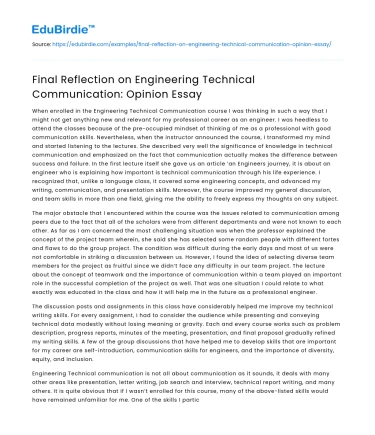When enrolled in the Engineering Technical Communication course I was thinking in such a way that I might not get anything new and relevant for my professional career as an engineer. I was heedless to attend the classes because of the pre-occupied mindset of thinking of me as a professional with good communication skills. Nevertheless, when the instructor announced the course, I transformed my mind and started listening to the lectures. She described very well the significance of knowledge in technical communication and emphasized on the fact that communication actually makes the difference between success and failure. In the first lecture itself she gave us an article ‘an Engineers journey, it is about an engineer who is explaining how important is technical communication through his life experience. I recognized that, unlike a language class, it covered some engineering concepts, and advanced my writing, communication, and presentation skills. Moreover, the course improved my general discussion, and team skills in more than one field, giving me the ability to freely express my thoughts on any subject.
The major obstacle that I encountered within the course was the issues related to communication among peers due to the fact that all of the scholars were from different departments and were not known to each other. As far as I am concerned the most challenging situation was when the professor explained the concept of the project team wherein, she said she has selected some random people with different fortes and flaws to do the group project. The condition was difficult during the early days and most of us were not comfortable in striking a discussion between us. However, I found the idea of selecting diverse team members for the project as fruitful since we didn’t face any difficulty in our team project. The lecture about the concept of teamwork and the importance of communication within a team played an important role in the successful completion of the project as well. That was one situation I could relate to what exactly was educated in the class and how it will help me in the future as a professional engineer.
Save your time!
We can take care of your essay
- Proper editing and formatting
- Free revision, title page, and bibliography
- Flexible prices and money-back guarantee
The discussion posts and assignments in this class have considerably helped me improve my technical writing skills. For every assignment, I had to consider the audience while presenting and conveying technical data modestly without losing meaning or gravity. Each and every course works such as problem description, progress reports, minutes of the meeting, presentation, and final proposal gradually refined my writing skills. A few of the group discussions that have helped me to develop skills that are important for my career are self-introduction, communication skills for engineers, and the importance of diversity, equity, and inclusion.
Engineering Technical communication is not all about communication as it sounds, it deals with many other areas like presentation, letter writing, job search and interview, technical report writing, and many others. It is quite obvious that if I wasn’t enrolled for this course, many of the above-listed skills would have remained unfamiliar for me. One of the skills I particularly lagged behind was my writing skills. This course taught me that technical communication is not opinion-based, and is not focused on the author and helped me to avoid technical jargon and write from an audience perspective.
A few of the topics covered by the instructor was a new experience for me. Elevator talk was one among them, it is an important idea that gave me a lot of confidence to talk in front of a manager or CEO. In addition to the notion of creating an impression on the receiver, it showed me to create the pitch in a time-framed fashion. Memos creation, Report writings, and formal email writing skills were all additional perks of this course. Another key importance of this subject was related to job search and to fit the resume based on the job requirements. The information given related to the preparation of a resume was really helpful for me as a final term student about to step into the job market.
I certainly believe this course is exceptionally relevant to my future career. One learning outcome that I will surely accommodate in the future is I will always analyze my audience when communicating with anyone. For example, if I am explaining my mechanical design drawings to a production line worker, I might want to discuss all phases of the drawing in a descriptive manner. On the contrary, when discussing the same drawing with a client, I might have to avoid technical jargon and talk about the final outcomes and how it complies with their requirements. To sum up, understanding the knowledge, biases, expectations, and opinions of one’s audience is substantial to effectively communicate in an engineering field.
Conclusion
The fundamental lesson learned in this course is that technical knowledge alone will not take you to any heights if you lack communication skills. The lectures, projects, discussions, and assignments in my Engineering technical communications class have prepared me for the future world. For engineers to be successful over the course of their careers, Professional communication skills and technical expertise are important. There will be many instances where you will have to convey portions of information properly and bring a balance between management and employees. For all these, you should be an effective communicator and a socially accepted engineer. As businesses and the economy continue to globalize, many professional engineering organizations have described their strategic vision for engineers to be able to communicate in a clear, concise manner. Essentially, effective shaping depends on audience expectations and needs. Overall, organizing thoughts and ideas is crucial for communicating methodical ideas in the engineering industry.






 Stuck on your essay?
Stuck on your essay?

